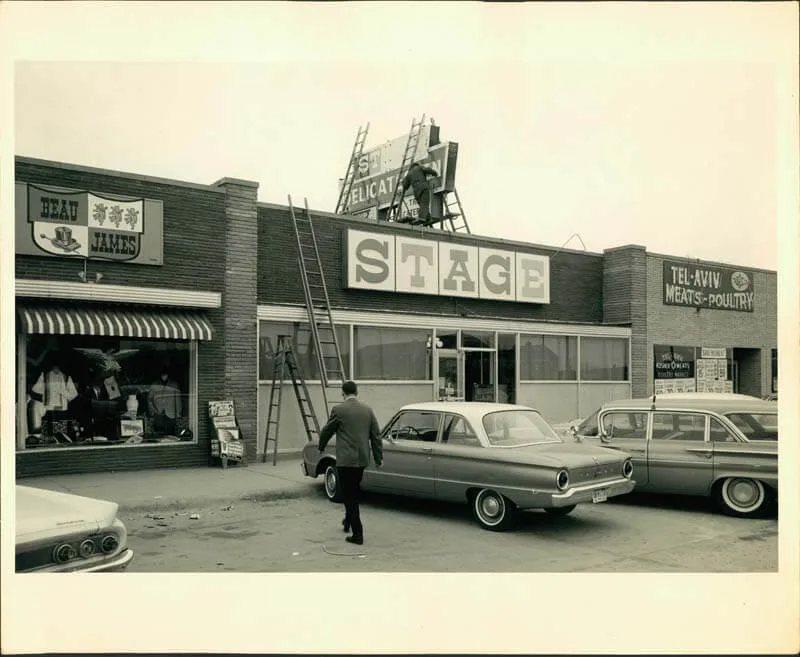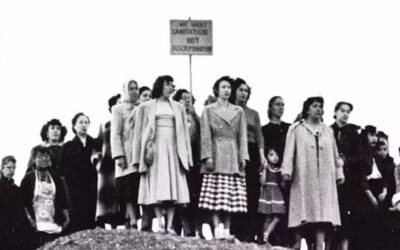
Source: Stage Deli, West Bloomfield Township
Midwestern cooking combines culinary traditions from our families’ immigrant backgrounds, locally grown and produced ingredients, and the foods of Indigenous tribes. And in Michigan especially, our home cookin’ includes provisions that were concocted, bottled, and packaged by mitten-state entrepreneurs.
MICHIGAN—The Jewish delis of New York may have earned national acclaim, but Jewish delis in Detroit are the country’s culinary underdogs. What makes them stand out? The bread.
Jewish people have lived in Detroit for at least two centuries. The earliest Jewish immigrants were mostly German, but plenty of Russian, Polish, and Hungarian Jews brought their family recipes with them as they settled in the Detroit-Ann Arbor area as well.
Many of the region’s Jewish families opened groceries and delis, like Freeman & Reese Grocers, Hiller’s, Farmer Jack’s, Zingerman’s, and the Stage Deli. It was at the Stage Deli, in the years after WWII when the composition of rye bread started including larger portions of cheaper and longer-lasting white flour, where the now-famous Detroit-style rye bread really began.
In the 1960s, former Army cook Jack Goldberg opened the Stage Deli on Nine Mile Rd. in Oak Park. Jack was a crafty Depression-era cook whose mother’s legendary cabbage and kreplach had led him to train in the best Detroit delis. Used to solving problems in non-traditional ways, Jack met the one that would put him on the map when rye flour gave way to the cheaper white blend.
Bread from local bakeries was delivered early in the morning. However, most of Jack’s customers were coming in at lunch, when the rye bread they wanted was already cold. Jack faced the same problem delis all over the country faced: Why should he pay for the good stuff, when it was just another piece of bread by the time it hit his customers’ mouths?
Jack started ordering his rye partially cooked, with the baking process halted about 80% of the way through. Then, before customers swarmed the deli for their sandwiches, Jack would finish baking the bread so they were still warm in time for lunch. Forgoing the thin slicer everyone else was using, Jack put the loaves on a deli meat slicer, where he cut the hot bread thick and fresh to order. The result was a slice perfect for supporting the weight of corned beef.
Jack’s double-bake method caught on, and soon enough, Jewish delis across the Motor City were selling warm, authentic rye bread that held up well under pressure. Jack Goldberg’s winning business formula is still used today at the Stage Deli in West Bloomfield.

‘The legend lives on’: Wreck of the Edmund Fitzgerald still resonates 50 years later
MARQUETTE, Mich. (AP) — Spend enough time along the shores of Lake Superior and it won’t be long before there’s some reminder of what happened “when...

New book shows how Mackinac Island became tourism gem
By Isabella Figueroa Nogueira, Capital News Service LANSING – Horse-drawn carriages clatter down car-free streets. The mouth-watering smell of fudge...

That one time in Michigan: When an ancient, Stonehenge-like structure was discovered in Lake Michigan
Journey beneath the waves of Lake Michigan to learn about a centuries-old secret—from Stonehenge to the Great Lakes. If you’ve ever visited...

7 creepy facts about Michigan they don’t teach you in school
Immerse yourself in the spirit of the season with seven creepy (or simply unexplained) facts about Michigan that textbooks ignore. Disappearing...

That one time in Michigan: When an official funeral was held for frozen pizzas
The next time you’re forced to discard a recalled product, draw inspiration from one of Michigan’s most inventive pizza producers. We’ve all...




